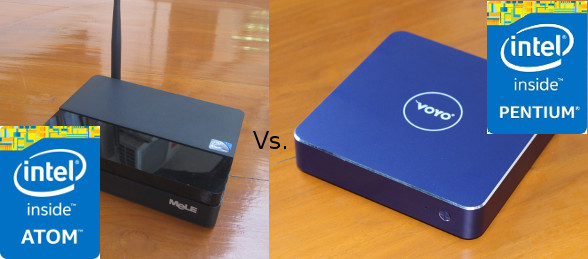Intel introduced new processors every year, but in most cases the performance improvement from new processor with a similar power profile is only incrementally better, as we’ve seen in our Atom X7-Z8700 vs Pentium N4200 benchmarks comparison, which means it’s not really worthwhile to upgrade performance-wise, unless you really a specific feature or interface found in the new processor. But what if we compare to processor from 2 to 3 years ago? Intel Atom Z3735F was a popular choice two years ago, and if you’re looking for a cheap Intel mini PC or TV box, that’s still the cheapest option with prices under $80. So I’ve decided to compare Intel Atom Z3735F (Bay Trail) processor with 2W TDP to the latest Pentium Celeron N4200 (Apollo Lake) with 6W TDP.
To do so, I gathered benchmarks results from MeLE PCG03 mini PC (PCMark 8) and PCG01 TV stick (Passmark + 3Dmark) for the Atom processor, as well as Voyo VMac Mini for the Apollo Lake processor. Please note that I only have PCMark 8 Home Baseline for PCG03, and not the Accelerated benchmark with OpenCL, but based on my results with K3 Wintel Keyboard PC, and reviews from Anandtech and IXBT, there’s no difference between PCMark Home Baseline and Accelerated for Atom Z3735F processor as it seems OpenCL is not supported in Atom Z3735F SoC (at least by PCMark), so I used PCMark 8 Home Baseline results for MeLE PCG03, and PCMark8 Home Accelerated for Voyo Vmac Mini. Unsurprisingly, the Pentium processors is faster in all tasks, and I highlighted the tests where it is at least twice as fast in green.
| Benchmark | MeLE PCG03 / PCG01 Intel Atom Z3735F @ 1.33 / 1.83 GHz (2W TDP) |
Voyo V1 Vmac Mini Intel Pentium N4200 @ 1.1 / 2.5 GHz (6W TDP) |
Ratio |
| PCMark 8 | |||
| Overall Score | 1,105 | 1,846 | 1.67 |
| Web Browsing – JunglePin | 0.58064s | 0.52267s | 1.11 |
| Web Browsing – Amazonia | 0.19591s | 0.18459s | 1.06 |
| Writing | 11s | 6.89837s | 1.59 |
| Casual Gaming | 6.7 fps | 10.38 fps | 1.55 |
| Video Chat playback | 30 fps | 30.02 fps | 1.00 |
| Video Chat encoding | 318 ms | 196.66667ms | 1.62 |
| Photo Editing | 2.7s | 0.45915s | 5.88 |
| Passmark 8 | |||
| Passmark Rating | 466 | 1,052.1 | 2.26 |
| 3DMark | |||
| Ice Storm 1.2 | 14,069 | 2,3511 | 1.67 |
| Cloud Gate 1.1 | 1,156 | 2,347 | 2.03 |
| Sky Diver 1.0 | 439 | 1,384 | 3.15 |
| Fire Strike | 0 (Driver failure) | 267 | N/A |
The main surprise here is how little difference there is for PCMark 8 web browsing benchmarks. Video chat is the same because the video was already rendered at 30 fps previously, and Photo editing is much faster, simply because of OpenCL support, and not because the processor is about 6 times faster. Passmark 8 and 3DMark benchmark show a clear boost of 2 to 3 times between an Atom Z3735F mini PC/Stick and a Pentium N4200 processor for the overall system and 3D gaming. If you own an Atom Z3735F mini PC, you’ll clearly feel a performance difference if you upgrade to an Apollo Lake processor. Beside the system performance, you’ll also benefit from faster interfaces like USB 3.0, Gigabit Ethernet, and potentially SATA, as well as better multimedia capabilities with for example H.265 video decoding. You’ll have to pay 2 or 3 times more for an Apollo Lake mini PC, but contrary to most Bay trail mini PCs, it will be usable as an entry-level computer.

Jean-Luc started CNX Software in 2010 as a part-time endeavor, before quitting his job as a software engineering manager, and starting to write daily news, and reviews full time later in 2011.
Support CNX Software! Donate via cryptocurrencies, become a Patron on Patreon, or purchase goods on Amazon or Aliexpress






Hmm, seems faster but not _that_ much faster on the cpu side. Looks like i might want to pick up a passive i3 to replace the aging z3735f after all
Could you please add Mozilla kraken (ideally in Chrome)?
@Someone from the other side
If you have the results. I could add them